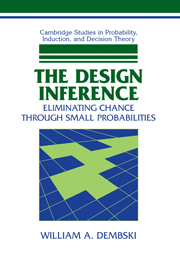Summary
Highly improbable events don't happen by chance. Just about everything that happens is highly improbable. Both claims are correct as far as they go. The aim of this monograph is to show just how far they go. In Personal Knowledge Michael Polanyi (1962, p. 33) considers stones placed in a garden. In one instance the stones spell “Welcome to Wales by British Railways,” in the other they appear randomly strewn. In both instances the precise arrangement of stones is vastly improbable. Indeed, any given arrangement of stones is but one of an almost infinite number of possible arrangements. Nevertheless, arrangements of stones that spell coherent English sentences form but a minuscule proportion of the total possible arrangements of stones. The improbability of such arrangements is not properly referred to chance.
What is the difference between a randomly strewn arrangement and one that spells a coherent English sentence? Improbability by itself isn't decisive. In addition what's needed is conformity to a pattern. When the stones spell a coherent English sentence, they conform to a pattern. When they are randomly strewn, no pattern is evident. But herein lies a difficulty. Everything conforms to some pattern or other – even a random arrangement of stones. The crucial question, therefore, is whether an arrangement of stones conforms to the right sort of pattern to eliminate chance.
Information
- Type
- Chapter
- Information
- The Design InferenceEliminating Chance through Small Probabilities, pp. xi - xivPublisher: Cambridge University PressPrint publication year: 1998
